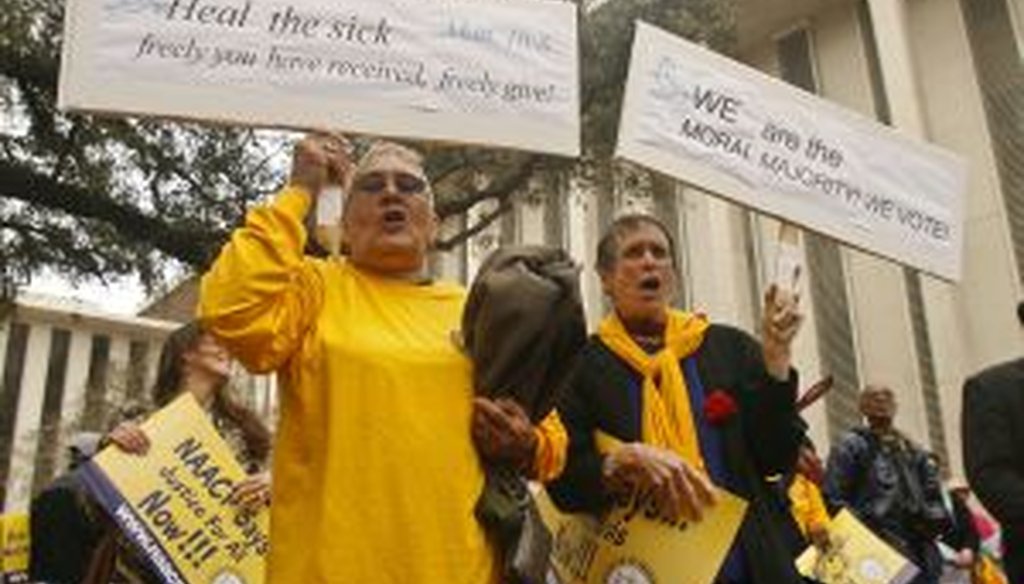Stand up for the facts!
Our only agenda is to publish the truth so you can be an informed participant in democracy.
We need your help.
I would like to contribute

Protestors in Tallahassee, Fla., on March 3 urge the Florida Legislature to expand Medicaid. (AP Photo)
Of the 25 states that haven’t expanded Medicaid coverage, many are still debating whether they made the right call.
In Florida, Republican House Speaker Will Weatherford remains against expanding the joint federal-state health care program to more low-income residents. His argument: Half those people can buy coverage for less than $30 on the federal insurance marketplace anyway.
We tackled this claim through our typical fact-checking methods. We were able to confirm that this is true for some people, though it’s not as common a scenario as Weatherford suggested. We rated his statement Half True.
Still, one question puzzled us: Why are people eligible at all for tax credits to pay for private insurance if the law intended for them to receive health care through a public program in the first place?
The Medicaid expansion was designed to cover households making up to 138 percent of the federal poverty level. Tax credits to buy insurance were supposed to help only those individuals making between 139 percent and 400 percent of the federal poverty level.
Sign up for PolitiFact texts
So why are individuals making between 100 and 138 percent of the federal poverty level eligible for tax credits if their states refuse to expand Medicaid?
We asked some experts to weigh in, and most said that it perplexed them as well.
John McDonough, director of the Harvard Center for Public Health Leadership, served as a senior advisor to the U.S. Senate Committee on Health, Education, Labor and Pensions from 2008 to 2010, when the health care law was written. So if anyone would know, you think it would be him.
But even McDonough said it remains a mystery.
Two provisions of the law are contradictory on their face. One says tax credits are available for people making as little as 100 percent of the federal poverty level. But the law also covered those individuals with Medicaid, and it says that if you're eligible for Medicaid, you can't receive tax credits.
Then the Supreme Court added a wrinkle.
After the justices made the Medicaid expansion optional for states back in June 2012, many states took the option of not expanding. As a result, millions of people lost out on Medicaid — but the once seemingly contradictory provision made them eligible for subsidies to buy insurance on the marketplace.
McDonough said he has asked many people who worked on the bill why it was written this way, and the explanations have varied.
Some believe it was an oversight: There were so many people and groups working on different portions of the bill, and there was a split between those putting together details for the Medicaid expansion and staffers writing the insurance market portion. When they put it all together, there may have been unintended contradictions that made it into law without being fixed, McDonough said.
Alternately, it could have been written that way intentionally to help people with very volatile incomes; they might be eligible for Medicaid one year but not the next, he said. This is known in the industry as "churn," and it’s a form of instability that’s common among low-wage earners.
Whatever the reason, it wasn’t written into the law as a backstop for states that rejected the Medicaid expansion — since no one writing the bill envisioned the Supreme Court making it possible for states to forgo the expansion. But that's the situation many states, including Florida, now find themselves in.
"The consequence of that snafu or ambiguity," McDonough said, "is far more significant in light of the Supreme Court decision than it would have been without it."
Our Sources
Kaiser Family Foundation, "Explaining Health Care Reform: Questions About Health Insurance Subsidies," July 2012
Phone interview with Rachel Garfield, senior researcher at the Kaiser Family Foundation, March 5, 2014
Phone interview with John McDonough, director of the Harvard Center for Public Health Leadership, March 6, 2014
PolitiFact Florida, "Will Weatherford says about half the people eligible for Medicaid expansion 'can buy a health care plan for $30 a month,'" March 7, 2014























































